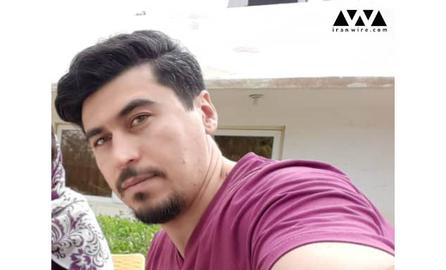“All my mother does is cry and weep. My father has been hugging Nasser’s picture and goes to his gravesite every morning. This tragedy is tearing our family apart. His wife is in the same situation. We buried Nasser’s body at 11 at night.”
Nasser Rezaei, a 25-year-old Kurdish poet, lived in the city of Fardis in Karaj, near Tehran. At 5:45pm on Sunday, November 17, the young poet called his brother Mansour and told him about the protests going on in Karaj, part of the nationwide demonstrations that were sparked when Iran’s government announced a threefold increase in fuel prices.
Mansour says his brother participated in the protests, but that he behaved peacefully. His poetic and civil nature, Mansour says, would not have allowed him to express his demands in any other than a peaceful way.
Fifteen minutes after Nasser’s call, Mansour was worried about his brother and called his mobile phone to see if he was okay; somebody else answered the phone. He told Mansour : “Nasser has been shot. He has been shot in his right eye. He is not breathing and I am taking him to Ghaem Hospital. Come.”
The Rezaei family lives in the city of Qorveh, in the western province of Kurdistan, far from Karaj. Mansour and his father immediately set out for Karaj from their home. Along the way, Mansour called the number of the person who had taken Nasser to the hospital to ask about his brother.
“He said ‘I gave Nasser’s personal effects to the hospital and have no more news of him,’” Mansour told IranWire. “He was telling us that Nasser was gone.”
Nasser’s father and brother reached Ghaem Hospital in Karaj at about 10pm and saw that it was overwhelmed by people. A crowd was waiting outside — but the doors were closed and nobody was allowed in except ambulances and medical staff. Ambulances were constantly coming and going.
“We returned to the hospital at 6am on Monday, November 18,” says Mansour. “We went inside and asked after Nasser. Around 7am they told us that Nasser’s body had been transferred to the morgue in Behesht Sakineh Cemetery and we should go there. After some paperwork, the morgue delivered the body to us at about 5pm.”
Nasser’s father Ebrahim was instructed to sign papers that promised that his son would be buried simply and in silence, and that no funeral ceremonies would be held. The family buried Nasser as soon as they arrived back in Qorveh.
“We buried Nasser around 11pm on the Monday,” says Mansour. “Only the family was present. We also held a mourning ceremony for him at the mosque. Nobody bothered us.”
Designated a Martyr
Officials then called the Rezaei family and told them that they wanted to designate Nasser a “martyr.” They also told the family that, if they wanted, they could file a complaint to try to identify the murderer of their loved one.
“How do they want to identify the killer?” asks Mansour. “There was nobody with him and you could not identify anything in that commotion. We asked them for only one thing. We told them: ‘We want nothing from you. Just leave us alone.’ We know we have no recourse and we cannot do anything. We do not intend to file a complaint. Whom are we going to complain against? Who is responsible for the shooting? You must have somebody to complain against.”
In their phone call, the officials also said that they intended to pay “blood money,” or financial compensation, to the families of those designated as “martyrs” in the protests. But Nasser’s family have made their decision. “They want to pay some money and call it compensation,” says Mansour. “Our family does not want it and will not accept either the money or the title of martyr.”
Mansour emphasizes that his family does not expect the government to take any action. According to him, his mother is praying that the person responsible will pay with his own life.
The tragedy has plunged Nasser’s family into a crisis. Mansour says that his mother cannot eat and only cries. His father hugs Nasser’s picture and at six o’clock every morning visits his son’s gravesite.
“There is no word, no sentence, that can describe the condition of my parents,” Mansour says. “And Nasser’s wife is doing no better; indeed, perhaps she is worse. Everybody loved Nasser. He never hurt anybody.”
Iranian officials have yet to officially announce the number of people killed during the November protests. Ali Shamkhani, the secretary of Iran’s Supreme Security Council, has claimed that more than 85 percent of people who lost their lives in Tehran province were victims of a “scheme” by “enemy groups.” But no matter what, it is not clear why the government refuses to announce how many people have been killed and why it has asked the families of the victims to keep silent about them.
Related Coverage:
Official Claims Mahshahr Protesters Were Armed, 12 December 2019
He was Unemployed. He Loved Freedom. They Killed him..., 10 December 2019
They’ve Killed My Brother. I Want Revenge, 6 December 2019
They Shot Him in the Heart. His Baby is Still Waiting for Him..., 5 December 2019
They Shot him in the Back. He Fought for his Life for 34 Hours. He Lost..., 4 December 2019
Heavy Machine Guns Used to Kill Protesters, 2 December 2019
Security Forces Abandoned his Body Outside the Morgue — After 5 Days, 1 December 2019
Security Forces Kill a 13-Year-Old Bystander, 26 November 2019
She was Helping the Injured When They Killed Her, 25 November 2019
visit the accountability section
In this section of Iran Wire, you can contact the officials and launch your campaign for various problems



























comments